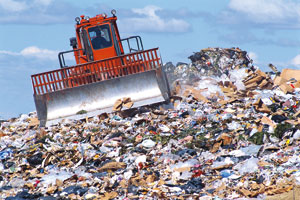What’s wrong with policies on waste, and how to get them right

Corbis
At Pope’s creek, on America’s Potomac river, there’s a pre-Columbian rubbish tip of oyster shells covering 30 acres, to an average depth of ten feet. Humanity has always produced waste in vast quantities; but more people, more consumption and the contribution emissions from rubbish make to climate change mean that disposing of the stuff is an increasingly contentious issue.
People feel that they have a natural right to throw away as much stuff as they like, just as those lucky native Americans chucked the shells from their plentiful oyster piles over their shoulders. They shouldn’t. Rubbish damages the environment and is expensive to dispose of. With household waste, just as with toxic chemicals, governments need to persuade people that they should be responsible for the muck they produce.
Trashy regulations
Americans are the champions of trash: on average they jettison over 700kg each a year. But developing nations are catching up fast. By 2030, Indians will be producing twice as much as they are now; Chinese people three times as much.
Waste is also becoming more hazardous. Modern industry produces many things, from coal ash to computers, that are difficult to dispose of properly. The consequences can be grotesque: in the city of Dzerzhinsk, in Russia, decades of slapdash handling of chemical waste has reduced male life expectancy to just 42 years. Rotting waste, meanwhile, produces methane, one of the more potent greenhouse gases, and thus contributes to global warming.
Yet as the special report on the waste business in this week’s issue argues, there are grounds for optimism amid the mounds of rubbish. Environmental concerns have spurred dramatic improvements in the way waste is managed in many countries. Recycling is becoming ever more common. Entrepreneurs are brimming with schemes to turn rubbish into electricity or fuel or fertiliser. Environmentalists dream of a world in which almost nothing is wasted.
But it is governments that have the power to turn such visions into reality, and their policies are all over the place. In America, for example, landfills containing household rubbish are subject to stringent regulation, whereas ones filled with toxic sludge from power plants are less tightly controlled. In Britain landfills are taxed out of all proportion to the damage they do the environment. In poor countries many governments often ignore waste altogether. Only 6% of Madagascar’s rubbish is even collected.
To clear up the mess, governments need to hold people and companies responsible for the waste they produce. One way of doing that is to work out the cost of disposal and charge firms and households for rubbish collection based on the volume they produce. That helps discourage people from chucking stuff out, and provides a revenue stream to dispose of it when they do. Another is to oblige manufacturers to take back and dispose of certain goods when consumers have finished with them. That gives firms an incentive to make their wares easy to recycle or re-use.
As consumers, people hate paying for rubbish disposal. But as voters, they claim to worry about the state of the planet. Such measures are the price of cleaning it up.
Source: The Economist
Read more from The Economist in their special report on waste:
- Talking rubbish
- You are what you throw away
- Down in the dumps
- A better hole
- The appliance of science
- Round and round it goes
- Muck and brass
- Less is more
- Sources and acknowledgments
- Offer to readers
Short link: http://whatel.se/~WZA1$2R

Recent Comments